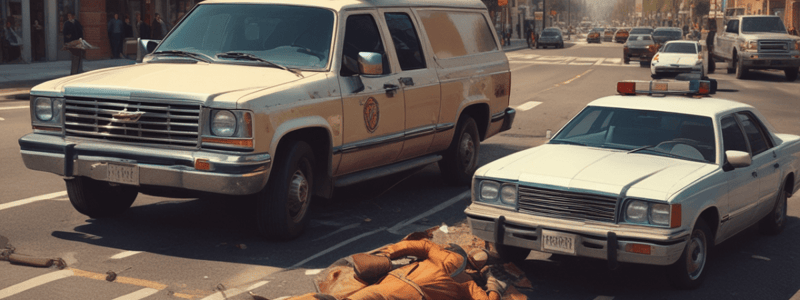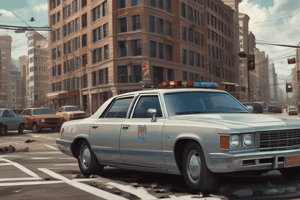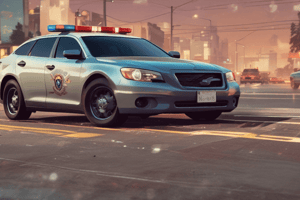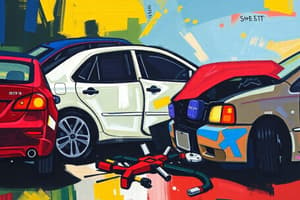Podcast
Questions and Answers
What is the main emphasis of the traffic crash investigation lesson?
What is the main emphasis of the traffic crash investigation lesson?
- Simulated traffic crashes training
- Interviewing drivers and witnesses (correct)
- Evidence collection and interpretation
- Scene protection and safety precautions
What is the term for the initial point of impact in a traffic crash?
What is the term for the initial point of impact in a traffic crash?
- First contact (correct)
- First harmful event
- Un-stabilized event
- Stabilized event
What is the purpose of identifying the chain of events in a traffic crash?
What is the purpose of identifying the chain of events in a traffic crash?
- To gather information from different tire marks
- To protect property and prevent theft at the scene
- To determine the relative importance of the order of events (correct)
- To identify the location of the crash event
What is the primary goal of protecting the scene of a traffic crash?
What is the primary goal of protecting the scene of a traffic crash?
What is the purpose of identifying the procedures for interviewing drivers and witnesses?
What is the purpose of identifying the procedures for interviewing drivers and witnesses?
What is the term for the location of the crash event as defined in the MUCR?
What is the term for the location of the crash event as defined in the MUCR?
What is a motor vehicle traffic crash?
What is a motor vehicle traffic crash?
What is the minimum requirement for a motor vehicle crash to occur?
What is the minimum requirement for a motor vehicle crash to occur?
What is an un-stabilized event?
What is an un-stabilized event?
What marks the end of an un-stabilized event?
What marks the end of an un-stabilized event?
How should crashes be located?
How should crashes be located?
What is perception of the hazard?
What is perception of the hazard?
What is encroachment?
What is encroachment?
What is the start of evasive action?
What is the start of evasive action?
What is the roadway?
What is the roadway?
What event takes place when one wheel of the vehicle leaves the roadway?
What event takes place when one wheel of the vehicle leaves the roadway?
What happens when one wheel of the vehicle goes off the shoulder or climbs the curb?
What happens when one wheel of the vehicle goes off the shoulder or climbs the curb?
What is the point where the force between the traffic unit and the object is the greatest?
What is the point where the force between the traffic unit and the object is the greatest?
When does force cease to exist between two objects in a traffic crash?
When does force cease to exist between two objects in a traffic crash?
What is the primary responsibility of an officer upon arriving at the scene of a traffic crash?
What is the primary responsibility of an officer upon arriving at the scene of a traffic crash?
Why should warning devices be placed far enough from the crash scene?
Why should warning devices be placed far enough from the crash scene?
What should be done to damaged vehicles blocking the roadway?
What should be done to damaged vehicles blocking the roadway?
What is a potential problem to consider while investigating a traffic crash?
What is a potential problem to consider while investigating a traffic crash?
What should be done to oncoming vehicles at night or in low-visibility conditions?
What should be done to oncoming vehicles at night or in low-visibility conditions?
What is the final event in a traffic crash?
What is the final event in a traffic crash?
Why should the investigator be mindful of the speed limit, sight distance, and stopping distances?
Why should the investigator be mindful of the speed limit, sight distance, and stopping distances?
Why may an officer be temporarily stationed at the scene of a traffic crash?
Why may an officer be temporarily stationed at the scene of a traffic crash?
What is essential for officers to do in the initial stages of a traffic crash investigation?
What is essential for officers to do in the initial stages of a traffic crash investigation?
What may be necessary when dealing with juveniles in investigations?
What may be necessary when dealing with juveniles in investigations?
Why may it be challenging to obtain statements from individuals involved in a traffic crash?
Why may it be challenging to obtain statements from individuals involved in a traffic crash?
How can an investigator gain the cooperation of uncooperative people?
How can an investigator gain the cooperation of uncooperative people?
What type of people may be instructed by their employers to say nothing about the collision?
What type of people may be instructed by their employers to say nothing about the collision?
What is the goal when questioning or interviewing people for crash investigations?
What is the goal when questioning or interviewing people for crash investigations?
What is the primary goal of the investigator during an interview?
What is the primary goal of the investigator during an interview?
What is the recommended approach to questioning drivers and witnesses?
What is the recommended approach to questioning drivers and witnesses?
Why may it be necessary to visit hospitals or other locations?
Why may it be necessary to visit hospitals or other locations?
What is the purpose of asking specific and clear questions?
What is the purpose of asking specific and clear questions?
What is essential for obtaining information from people involved in a traffic crash?
What is essential for obtaining information from people involved in a traffic crash?
What should an investigator avoid doing during an interview?
What should an investigator avoid doing during an interview?
How would you describe finding out what a person knows about a traffic crash?
How would you describe finding out what a person knows about a traffic crash?
What is the term for a mark made on a surface by a rolling tire without sliding?
What is the term for a mark made on a surface by a rolling tire without sliding?
Why should an investigator avoid suggesting answers to drivers or witnesses?
Why should an investigator avoid suggesting answers to drivers or witnesses?
What is the primary goal of active listening during an interview?
What is the primary goal of active listening during an interview?
What is the recommended approach to asking questions?
What is the recommended approach to asking questions?
What should an investigator do if they have doubts about a statement made by a driver or witness?
What should an investigator do if they have doubts about a statement made by a driver or witness?
What is the term for a friction mark made by a tire that is sliding without rotation on a road or other surface?
What is the term for a friction mark made by a tire that is sliding without rotation on a road or other surface?
What is the term for the friction mark made by a tire that is both rotating and slipping on a road or other surface?
What is the term for the friction mark made by a tire that is both rotating and slipping on a road or other surface?
What is usually the composition of the black mark on a bituminous surface?
What is usually the composition of the black mark on a bituminous surface?
What is the characteristic of a skid-mark on a soft material?
What is the characteristic of a skid-mark on a soft material?
What is the effect of abrasive particles or loose gravel on the surface?
What is the effect of abrasive particles or loose gravel on the surface?
What happens to the surface of a wet road when a skidding tire passes over it?
What happens to the surface of a wet road when a skidding tire passes over it?
What is a characteristic of skid-marks?
What is a characteristic of skid-marks?
What can cause a gap in a set of skidmarks?
What can cause a gap in a set of skidmarks?
What type of skidmark is characterized by short interruptions?
What type of skidmark is characterized by short interruptions?
What is a yawmark also known as?
What is a yawmark also known as?
What is the type of skidmark that is made by a rotating tire that is slipping more or less parallel to its axis?
What is the type of skidmark that is made by a rotating tire that is slipping more or less parallel to its axis?
What is an acceleration scuff?
What is an acceleration scuff?
Why is it difficult to determine the exact point where skidding begins?
Why is it difficult to determine the exact point where skidding begins?
What is the term for the area prior to a discernible skidmark?
What is the term for the area prior to a discernible skidmark?
Why is it important to mark the beginning and end of skidmarks?
Why is it important to mark the beginning and end of skidmarks?
What is the purpose of measuring and photographing skidmarks?
What is the purpose of measuring and photographing skidmarks?
What is the purpose of finding the average skidding distance?
What is the purpose of finding the average skidding distance?
Why is it important to examine the road surface from different angles?
Why is it important to examine the road surface from different angles?
What can be used to determine the minimum speed of a motor vehicle prior to a collision?
What can be used to determine the minimum speed of a motor vehicle prior to a collision?
Why may an officer with specialized training be necessary in a traffic crash investigation?
Why may an officer with specialized training be necessary in a traffic crash investigation?
What is the first step in determining a minimum speed of a vehicle?
What is the first step in determining a minimum speed of a vehicle?
What is the purpose of measuring the overall length of each skidmark and dividing it by two?
What is the purpose of measuring the overall length of each skidmark and dividing it by two?
What is the recommended test speed for conducting test skids?
What is the recommended test speed for conducting test skids?
What is the minimum number of test skids recommended to conduct for comparison purposes?
What is the minimum number of test skids recommended to conduct for comparison purposes?
What is the formula to obtain a coefficient of friction value using test skids?
What is the formula to obtain a coefficient of friction value using test skids?
What is the purpose of using a drag tire or drag sled in traffic crash investigation?
What is the purpose of using a drag tire or drag sled in traffic crash investigation?
What should be duplicated when conducting test skids?
What should be duplicated when conducting test skids?
What should be used to determine the coefficient of friction value with the use of a drag tire or drag sled?
What should be used to determine the coefficient of friction value with the use of a drag tire or drag sled?
Why is it necessary to conduct multiple drag pulls with a drag tire or drag sled?
Why is it necessary to conduct multiple drag pulls with a drag tire or drag sled?
What should be done to the pull values obtained from multiple drag pulls with a drag tire or drag sled?
What should be done to the pull values obtained from multiple drag pulls with a drag tire or drag sled?
What is the purpose of using the nomograph printed on the Northwestern Traffic Template or the Institute of Police Technology and Management Traffic Template?
What is the purpose of using the nomograph printed on the Northwestern Traffic Template or the Institute of Police Technology and Management Traffic Template?
What is the primary objective of the lesson plan 'Introduction to Traffic Radar'?
What is the primary objective of the lesson plan 'Introduction to Traffic Radar'?
What is the term 'RADAR' an abbreviation for?
What is the term 'RADAR' an abbreviation for?
What is the fundamental principle that explains how radar signals are changed by reflection off a moving object?
What is the fundamental principle that explains how radar signals are changed by reflection off a moving object?
What is the relationship between the frequency, wave length, and speed of a radar signal?
What is the relationship between the frequency, wave length, and speed of a radar signal?
What are some of the factors that can affect radar accuracy and/or effectiveness?
What are some of the factors that can affect radar accuracy and/or effectiveness?
What is the primary goal of identifying the elements of the fundamental case law affecting the use of radar speed measurement and enforcement?
What is the primary goal of identifying the elements of the fundamental case law affecting the use of radar speed measurement and enforcement?
What is the requirement for the radar instrument?
What is the requirement for the radar instrument?
Where should the radar device be used to minimize distortion of readings?
Where should the radar device be used to minimize distortion of readings?
What is the purpose of the tuning forks?
What is the purpose of the tuning forks?
What is the purpose of the Tactical Use of Radar Instructor?
What is the purpose of the Tactical Use of Radar Instructor?
What is an example of a Single-Lane Oncoming Single Vehicle scenario?
What is an example of a Single-Lane Oncoming Single Vehicle scenario?
What is the primary unit of measurement for frequency in a radar signal?
What is the primary unit of measurement for frequency in a radar signal?
What is the speed of a radar signal?
What is the speed of a radar signal?
What is the effect of relative motion on the frequency of a radar signal?
What is the effect of relative motion on the frequency of a radar signal?
What is the purpose of the Photo-Speed Recorder?
What is the purpose of the Photo-Speed Recorder?
What is the term for the distance from the beginning of the peak to the end of the valley in a radar signal?
What is the term for the distance from the beginning of the peak to the end of the valley in a radar signal?
What is the effect of the angle of the radar antenna on the accuracy of the target reading?
What is the effect of the angle of the radar antenna on the accuracy of the target reading?
What is the purpose of the high and low tuning forks in testing a radar unit?
What is the purpose of the high and low tuning forks in testing a radar unit?
What is the primary goal of an officer when using radar equipment to detect speed?
What is the primary goal of an officer when using radar equipment to detect speed?
What is the effect of the patrol car's speed on the radar reading?
What is the effect of the patrol car's speed on the radar reading?
Flashcards are hidden until you start studying
Study Notes
Traffic Crash Investigation
Definition of Motor Vehicle Traffic Crash
- A motor vehicle crash that occurs on a trafficway or in which a harmful event occurs on a trafficway
- Includes motor vehicle crashes and motor vehicle traffic crashes
- To be classified as a motor vehicle crash, the following elements must be present:
- Involvement of at least one motor vehicle in transport
- At least one harmful event
- The harmful event is the result of an unintentional act
- The harmful event is not the direct result of a cataclysm
- The crash was not initiated by an action of an aircraft or watercraft
- The crash does not include any harmful event involving a railway vehicle in transport prior to involvement of a motor vehicle in transport
Unstabilized Event and Stabilized Event
- Unstabilized event: an event or set of events that originates when control is lost and terminates when control is regained
- Stabilized event: marks the end of an unstabilized event, usually when persons and property come to final rest
Chain of Events
- A series of events that make up a traffic crash
- Events may not always occur in the same order
- Each traffic unit involved in the crash has its own chain of events
- The chains of events for two traffic units involved in the same crash will always have one or more links or events in common
Investigating a Traffic Crash
- Upon arrival at the scene, make the scene safe to prevent further damage or injury
- Identify and locate drivers, passengers, witnesses, and other people who may have a connection with the collision
- Obtain information from people involved in the crash while they are still at the scene
- Handle evidence and valuable belongings properly
- Take photographs and measurements of the scene before clearing the roadway
Interviewing Witnesses and Drivers
- Explain who you are and what your interest is in the collision
- Be objective, positive, and diplomatic
- Ask specific and clear questions
- Do not suggest answers or argue with the person being questioned
- Be adaptable and practice good listening skills
Tire Marks
- Tire marks can be classified into two types: imprints and friction marks
- Imprints are marks made on a surface by a rolling tire without sliding
- Friction marks are made by a tire that is sliding or both rotating and slipping on a surface
- Skid marks are friction marks made by a tire that is sliding without rotation
- Scuffmarks are friction marks made by a tire that is both rotating and slipping### Types of Skidmarks
- Gap skidmarks are created when brakes are pumped or the driver's foot slips off the brake pedal, resulting in short spaces between the skidmarks.
- Skip or bounce skidmarks are caused by bouncing during braking, road bumps or holes, or collisions, and are characterized by short distances between interruptions.
- Yawmarks are scuffmarks made by a rotating tire that is slipping parallel to its axis, also known as centrifugal skidmarks, critical speed scuffmarks, or sideslip marks.
- Acceleration scuff is a scuffmark made when sufficient power is supplied to the driving wheels to make at least one spin or slip on the road surface.
- Flat tire mark is a scuffmark made by an over-deflected tire with too little air pressure.
Measuring Skidmarks
- When measuring the length of gap skidmarks, only measure the marks themselves, excluding the spaces between them.
- When measuring skip skids, treat them as if there were no skips, and measure the entire length of the skid from beginning to end.
Investigating Skidmarks
- The exact point where skidding begins is difficult to determine due to tires sliding without leaving a visible mark and the time required for the wheels to stop rotating.
- The length of the transitional period depends on how quickly brakes are being applied.
- Any speed calculated from skidmarks is referred to as a minimum speed.
- The investigator must be careful in observing the evidence in the indefinite area where the brakes are applied, known as the shadow, impending skidmarks, or incipient skidmarks.
Analyzing Skidmarks
- The investigating officer can determine the minimum speed of a motor vehicle prior to the collision using basic speed analysis and math calculations.
- The steps to determine minimum speed include locating and measuring skidmarks, finding the average skidding distance, determining the coefficient of friction, and finding the minimum speed.
Determining Coefficient of Friction
- There are numerous methods of determining the coefficient of friction, including published data on typical values for different road surfaces.
- Test skids can be conducted to obtain a specific value for the surface in question, duplicating conditions at the time of the collision.
- The mathematical formula to obtain a coefficient of friction value is: 30 x D, where f is the drag factor, S is the test speed, and D is the longest skid length.
- The drag tire or drag sled method can also be used to obtain a coefficient of friction value.
Determining Minimum Speed
- Once the coefficient of friction and skid distance are known, the minimum speed of the vehicle at the beginning of the skid can be determined using the nomograph or mathematical formula.
- The nomograph can be used to determine the coefficient of friction value or crash vehicle speed once the variables are known.
Introduction to Traffic Radar
- RADAR stands for Radio Detecting and Ranging, a device used to detect and measure the speed of distant objects by analyzing radio waves reflected from their surfaces.
- The first traffic law was passed in 1652, prohibiting the riding or driving of horses at a gallop within city limits.
- The first automobile speed regulation was enacted in 1912, limiting automobile speeds to 12 mph in the country and 8 mph within city limits.
Frequency and Wave Length
- Frequency is the number of waves transmitted in one second, usually measured in cycles per second.
- Wavelength is the distance from the beginning of the peak to the end of the valley, with most radars operating within the X-band (10.525 billion waves per second) or K-band (24.15 billion waves per second).
- Radar signals travel at the speed of light, 186,000 miles per second.
Doppler Principle
- The Doppler Principle states that relative motion causes a signal's frequency to change.
- When objects are moving closer together, the frequency increases, and when they are moving farther apart, the frequency decreases.
- The amount of frequency change is determined by the speed of the relative motion.
Factors Affecting Radar Accuracy
- Angle Effect: The angle of the radar antenna can cause an improper target reading.
- Reflective capability: The radar unit's operation is affected by the reflective capability of targets, their position, and their actual speed.
- Batching: The radar adds a fraction of the patrol vehicle's speed to the violator's speed.
- Scanning Effect: The rapid swinging past a fixed object of a stationary radar antenna can produce a speed reading.
- Panning Effect: Can occur with two antenna units when the antennas are pointed at each other, causing feedback.
- Turn on Power Surge: Turning on the power to a unit can cause a speed reading due to the sudden surge of voltage.
- Mirror Switching Effect: Can occur on Speed gun Eights if the operator points the unit out the back window and uses the mirror to read the display without activating the mirror switching device.
- Patrol Speed Shadow Effect: Occurs if the beam of the radar unit attaches onto a moving object instead of the terrain.
Basic Operations of Moving Radar
- Target Speed = Closing Speed - Patrol Speed
- High Doppler and Low Doppler frequencies are used to calculate the target speed.
- Testing the unit involves activating the high and low tuning forks and holding them in front of the unit to give a target speed.
Fundamentals of Case Law
- The officer must prove that a particular speed law was violated, the defendant was the driver, and the offense occurred on a public thoroughfare.
- The officer must also prove that the correct vehicle was stopped, and that the vehicle in question appeared to be traveling at the speed indicated on the RADAR equipment.
- Special requirements for moving radar include:
- Operator having sufficient training and experience
- The radar instrument must have been in proper working condition (internal test)
- The device was used where road conditions would distort the readings as little as possible (e.g., not raining)
- The patrol car's speed was verified (speedometer)
- The instrument's accuracy was tested (tuning forks)
Studying That Suits You
Use AI to generate personalized quizzes and flashcards to suit your learning preferences.





